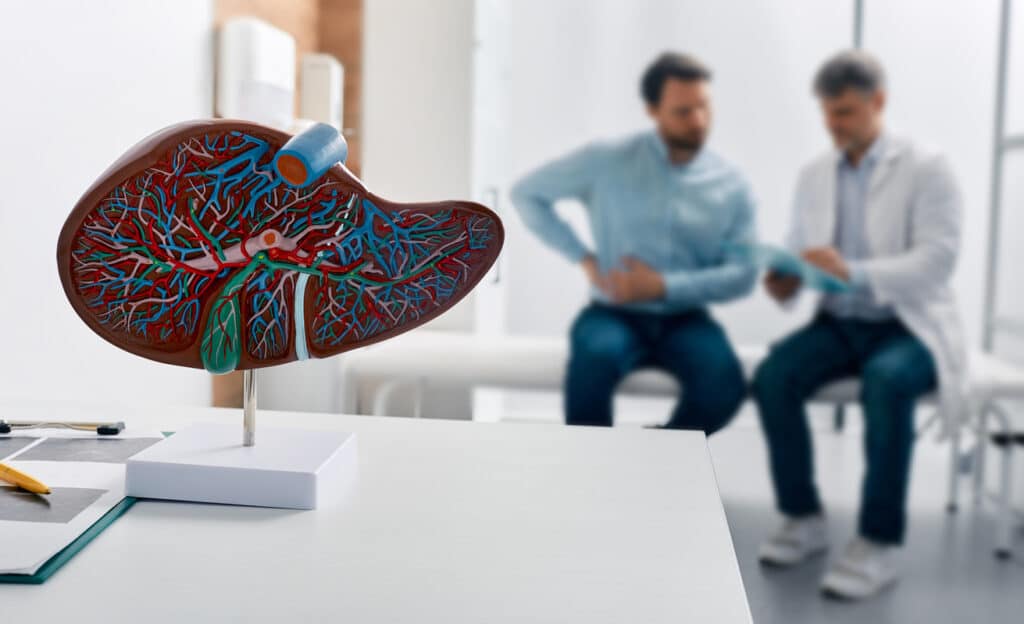Hepatitis C is a viral infection that attacks the liver. Most people infected with the hepatitis C virus have no symptoms. Most don't know they have the infection until liver damage shows up, sometimes decades later, or through detection during a routine medical exam.

Hepatitis C usually produces no signs or symptoms during its earliest stages. When signs and symptoms do occur, they may include:
Hepatitis C is caused by the hepatitis C virus, which is spread when you come in contact with contaminated blood – often through shared use of needles. Your risk of hepatitis C is increased if you:
Testing for hepatitis C in people who have a high risk of the virus may help doctors recommend options to slow liver damage. This is recommended because hepatitis C often begins damaging the liver before it causes symptoms. Blood tests may help diagnose the virus as well as evaluate the disease and determine treatment options.
Yes, several risk factors are associated with the transmission of the hepatitis C virus (HCV). Hepatitis C is primarily spread through contact with the blood of an infected person. Here are common risk factors for contracting hepatitis C:
It's important to note that hepatitis C is not spread through casual contact, such as hugging, kissing, or sharing eating utensils. The majority of individuals with hepatitis C do not have symptoms initially, so it's possible to have the virus and unknowingly transmit it to others.
Hepatitis C (HCV) can lead to various complications, particularly when the infection becomes chronic. Many people with hepatitis C may not experience symptoms initially, but over time, the virus can cause liver damage, inflammation, and other health issues. Here are some possible complications associated with chronic hepatitis C:
It's important to note that the progression to severe complications can take many years, and not everyone with chronic hepatitis C will develop these complications. The risk of complications is influenced by factors such as the duration of infection, age, other medical conditions, and lifestyle factors.
Treatment for hepatitis C isn't always necessary. Your provider may recommend follow-up tests to monitor your liver for damage. When treatment is recommended, it may include antiviral medications, and vaccinations to protect against other forms of hepatitis. If your liver has been severely damaged, a transplant may also be an option. Northeast Digestive Health Center's comprehensive Hepatitis C Clinic offers a wide range of treatment and monitoring options.
Hepatitis C is the most common type of chronic viral infection occurring in blood in the United States. Anywhere from 2.7 million to 3.9 million people in the US have hepatitis C. Many people who have hepatitis C do not know they have the condition.
Hepatitis C occurs among people of all ages. Some people have a higher risk for developing hepatitis C, including:
- People who have injected drugs
- Those who had received a blood transfusion or organ transplant before 1992
- People who have hemophilia and who received clotting factor products before 1987
- Individuals on kidney dialysis
- Those with HIV infection
- Children born to HCV-positive mothers
- Healthcare workers who have been in contact with blood or infected needles
- People who have tattoos or piercings
In its early stages, hepatitis C causes no symptoms or causes very mild symptoms – many people are unaware that they have the disease. If these symptoms develop in the initial stages, they usually go away within a few weeks. About 15 to 25 percent of people infected with HCV will fight off the disease and suffer no long-term effects.
Between 75 and 85 percent of people infected with HCV will develop a chronic hepatitis C infection. Still, many will not experience symptoms of the disease, even years after infection. The infection will remain with them until they undergo treatment.
Ten to 20 percent of those with chronic infections will experience gradual liver damage over the years and eventually develop cirrhosis. This can take 20 years or longer after the initial infection.
Hepatitis C goes away on its own without treatment in about 15 to 25 percent of people infected with the hepatitis C virus.
Alcohol can contribute to worsening liver disease by causing inflammation and scarring. Hepatitis C can make your liver more sensitive to the effects of alcohol. Consult with your doctor to learn if any amount of alcohol is safe for you to drink.